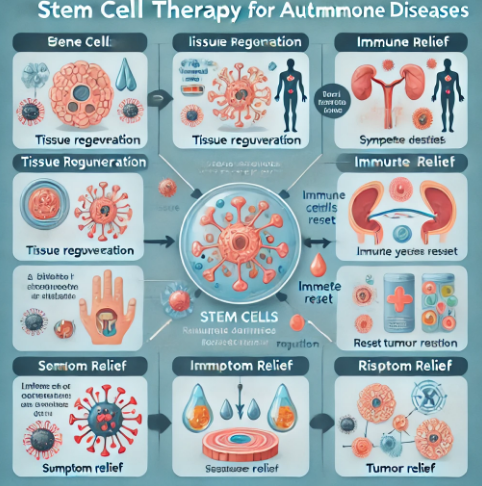Introduction
Stem cell therapy has become one of the most revolutionary developments in modern medicine, offering significant potential in treating a wide range of diseases. In recent years, it has emerged as a critical area of research, especially for treating autoimmune diseases such as rheumatoid arthritis, multiple sclerosis, and lupus. This article explores how stem cells are being used to treat these conditions, highlighting the benefits and risks of this emerging therapy.
What are Autoimmune Diseases?
Autoimmune diseases occur when the immune system mistakenly attacks the body’s healthy cells instead of targeting viruses or bacteria. These diseases encompass a variety of chronic conditions that affect multiple systems in the body, including the joints, skin, internal organs, and even the nervous system.
What is Stem Cell Therapy?
Stem cells are undifferentiated cells with the potential to transform into various specialized cell types within the body. They are used in therapy by replacing or repairing damaged cells in tissues affected by certain diseases. Stem cell therapy is a type of regenerative medicine aimed at improving or restoring the function of damaged tissues.
How is Stem Cell Therapy Used to Treat Autoimmune Diseases?
The fundamental idea behind stem cell therapy in autoimmune diseases is that these cells can rebuild or reset the patient’s immune system, halting or reducing the body’s attack on itself. There are several approaches to stem cell therapy for autoimmune conditions, including:
- Autologous Stem Cell Therapy: In this method, stem cells are harvested from the patient’s own body, processed, and reintroduced.
- Allogeneic Stem Cell Therapy: This involves using stem cells from a donor, which may be necessary if the patient’s cells are severely compromised.
Potential Benefits of Stem Cell Therapy
- Symptom Relief: Stem cell therapy has shown promise in reducing the severity of symptoms in autoimmune diseases like rheumatoid arthritis and multiple sclerosis.
- Tissue Regeneration: Stem cells may help repair and regenerate damaged tissues, promoting healing.
- Disease Progression Halt: In some cases, stem cell therapy has been effective in halting the progression of autoimmune diseases, preventing further deterioration.
Risks and Challenges
- Rejection of Stem Cells: There is a risk that the patient’s body may reject the transplanted stem cells, especially if they are from a donor.
- Tumor Growth: In some cases, stem cells may lead to abnormal cell growth, increasing the risk of tumor formation.
- High Costs: Stem cell therapy remains expensive and is not widely available.
Recent Studies
Recent research points to promising outcomes in the use of stem cells to treat autoimmune diseases. A study published in the Journal of Autoimmunity shows that stem cells can modulate the immune system and alleviate symptoms in patients with multiple sclerosis.
Conclusion
Stem cell therapy represents a promising avenue for treating autoimmune diseases. However, ongoing research is needed to fully understand the benefits and risks. Each patient’s case should be carefully evaluated, and treatment should be administered under the guidance of medical professionals.
References:
- Trounson, A., & McDonald, C. (2015). Stem Cell Therapies in Clinical Trials: Progress and Challenges. Cell Stem Cell.
- Burt, R. K., et al. (2019). Stem Cell Therapy for Autoimmune Diseases. The Lancet.

